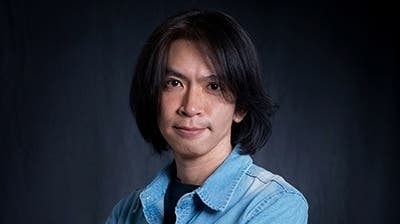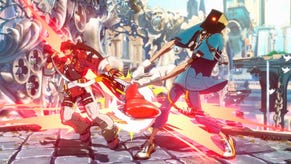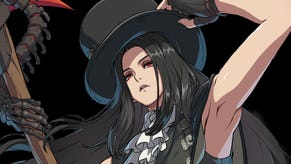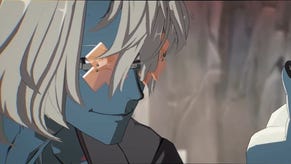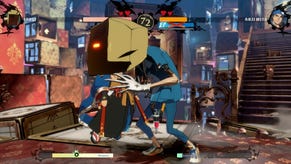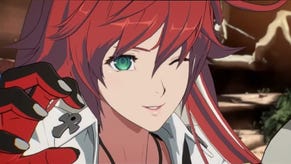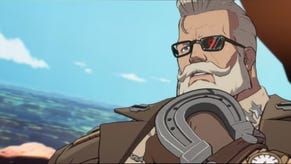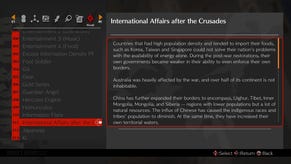With Guilty Gear Strive, Daisuke Ishiwatari aims to make one of the most complex fighting games around finally accessible
"We wanted to open up Guilty Gear."
Guilty Gear Strive is nearly upon us. Developer Arc System Works has held a number of beta tests, each with its own set of issues pounced upon by the anime fighting game series' fans. But the bigger picture is this: with Strive, chief creator Daisuke Ishiwatari aims to do the seemingly impossible - make Guilty Gear accessible.
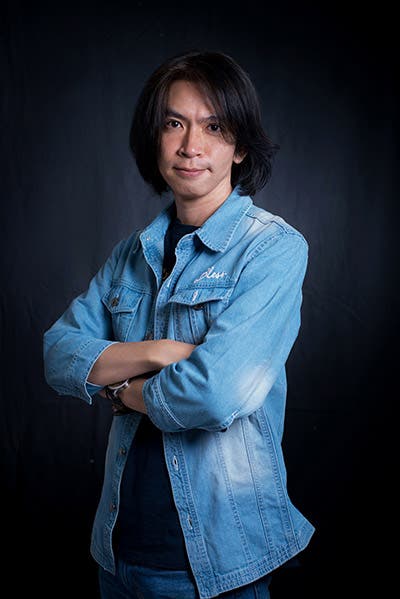
Guilty Gear's reputation precedes itself. Perhaps it would be better to say Guilty Gear's reputation hangs around its neck like a cowbell. Bong! Here comes another Guilty Gear. Head for the hills! This one's even harder than the last! Long combos, brutal timing, multiple complex mechanics and tricky characters - Guilty Gear has it all and then some. Play online as a newcomer against the series' modest but seriously properly into it fanbase and, well, you can imagine how hard things can get.
With Strive, Arc System Works hopes to finally "open up" Guilty Gear, 23 years after it made its debut on PSone. That's what Daisuke Ishiwatari told me in a recent interview over Zoom. Over the course of 45 minutes, I chatted with Ishiwatari about the development of Strive, what it sets out to achieve, and tried to get some insight into the various design decisions the team made along the way. We discuss everything from tweaks to Guilty Gear's famous Gatling combos, the addition of wall breaks, modes that failed to make launch because of the impact of the coronavirus pandemic, Strive's already controversial 2D lobbies, new characters and the seemingly overpowered poster boy Sol Badguy - who, by the way, Ishiwatari voices himself.
What was your goal with Strive, particularly in relation to differentiating it from previous games in the series?
Daisuke Ishiwatari: In general, the Guilty Gear series up until now has become something only the core fans could keep up with. So we wanted to make something entirely new, that a new audience could enjoy.
In what ways has the game changed in order to make it something a new audience could enjoy?
Daisuke Ishiwatari: The biggest thing that has changed is, in previous Guilty Gear games you needed to memorise long combos in order to play the game. Previously, before improving in play, you had to memorise these difficult things.
We don't want to create a misunderstanding. Sometimes the series fans have the impression the game became simple, and now it's shallow. However, in the end, what really changed is the first feeling, like the impression you have when you first play the game. It may feel simpler. However, when you play the game on a deeper, more involved level, it's just as difficult, and there are still the challenging aspects.
One thing you have changed is the way the Gatling combos work in Strive. They appear to have been stripped back somewhat. Can you explain your design goals for the new system?
Daisuke Ishiwatari: For the previous Guilty Gear games, up until Xrd, they're starting in the arcades. Because there are many fans who have been playing Guilty Gear ever since then, each game built on top of the other. So, for the fans who have been playing for a very long time, there's a lot of things they don't need to learn anymore. When a new Guilty Gear comes out, they're already very familiar with it.
So, there was a very big difference in the skill level between a player who has played the Guilty Gear series until now, and a new player who may be interested in the series for the first time. So we wanted to do something about this issue. We looked back and thought, it's a shame this is the case. We wanted to open up Guilty Gear.
Guilty Gear has a reputation for being very hard, which is a roadblock for some newcomers. Why should they give Strive a chance? What is the first thing they should try to do in the game?
Daisuke Ishiwatari: First reason, there is no longer the big difference in knowledge between Guilty Gear series fans and new players. So the start line for players who are not familiar with the series is not so far away from the more experienced players any more, so it should be easier to get into.
Second of all, the damage the characters deal in this game has vastly increased compared to previous titles. So even if you get a hit in by chance, like you get a lucky hit, you can deal quite a bit of damage to your opponent. In previous Guilty Gear games what you had to do was hit with a smaller, weaker attack and you could lead into big damage from that. So you had to learn the combo recipe from there. However, in Guilty Gear Strive, if you hit one punch it can do quite a bit of damage to the opponent, depending on the situation. So, it should be easier to play in a more intuitive way for new players.
One of the new mechanics in Strive is the Wall Break system. What are you hoping to achieve with it?
Daisuke Ishiwatari: One element of fighting games is when one player gets the other in the corner of the stage, they have a significant advantage. So, it can lead to them winning the match just from getting your opponent in the corner. Of course, we do think it is an accomplishment in itself to get your opponent in the corner, so there should be a reward for that. However, we wanted to make it so there are more opportunities for both players. So, after you deal a certain amount of damage you go to the next stage and start from the initial positions again. Basically, it's more back and forth between the players.
Do you expect some players will try to avoid breaking the wall so they can continue to attack their opponent in the corner? Or do you expect most players will wall break and stage transition?
Daisuke Ishiwatari: Yes, this is actually an issue we faced before in previous Guilty Gear games. As you know, there's the Dust attack in the Guilty Gear series, where when you hit the opponent it knocks them up into the sky and you can follow them up. Actually, before it has been the case you would be able to deal more damage if instead of following the opponent up after the Dust attack, you wait for them to fall. So, the more advanced the player becomes, this choice of not following them after the Dust would become more common. From a design perspective, that isn't the elegant game design we were looking for. So we wanted to avoid this issue. If there's going to be a mechanic where you can stage transition after breaking the wall, we would like there to be enough reward that there is a merit to choosing to break the wall, rather than choosing to ignore the system.
Your story mode is cutscenes only, with no interaction. Why do you do this?
Daisuke Ishiwatari: Aside from being a fighting game, Guilty Gear as an IP has a lot of fans of the series who want to see the story mode. For some of them it's difficult to play the game itself, and they struggle to see the continuation of the story. We would hear stories like this from players who are interested in Guilty Gear for the IP. So we decided to take this option with the story mode.
What impact has the coronavirus pandemic had on the production of the game?
Daisuke Ishiwatari: Regarding the details, it would be many, many small parts. But in general, not being able to meet with people in person and discuss face-to-face, it really has a big impact on the development as a whole. So we can say for sure it was slowed down as a result of it.
I read in a previous interview that you were forced to cut some modes for launch because of the impact of the pandemic. Can you talk about those modes and whether you plan to add them into the game at some point in the future?
Daisuke Ishiwatari: We can't say too much yet regarding some things that may not be included in the game. However, one thing we can say is the digital figure mode, which has been in previous titles, this was intended to be in the game upon release. However, it didn't make it in time, due to the development delay. This will be added in a free update at a later time.
I understand there was once a plan for a PlayStation 5-exclusive mode. Can you say if that was cut, or whether it will come later?
Daisuke Ishiwatari: Yes, that specifically is what was impacted by the coronavirus pandemic and didn't make it. It's a very big idea we had for this mode! So we can't spoil it. Sorry!
Can you say whether it will be something that will be released at some point after the game comes out? Or has it been scrapped entirely?
Daisuke Ishiwatari: We can confirm it has not been cancelled. It is not scrapped.
You recently held the final open beta for Strive. What changes will players who played the final beta notice compared with the launch version?
Daisuke Ishiwatari: We can't say the exact details. However, in general what we provided with the open beta test each time, it was not our ideal image of what the final product of Guilty Gear Strive will be. We are trying to resolve the issues. I think players who played the open beta will notice quite a few differences between that and the final game.
Fans have debated your new lobby system ever since it was revealed. Why did you decide to go with a 2D lobby system, with avatars and different rooms, rather than a regular matchmaking system with ranks, the kind you see in other fighting games?
Daisuke Ishiwatari: There are two major reasons why we went with this style of lobby. One is we wanted to make it completely separate and distinct from previous Guilty Gear games. This was our determination to make it stand out and separate from the previous Guilty Gear games.
The second reason was we wanted to be able to expand upon the lobby after release. With the previous style of other Arc System Works games, it was difficult to expand and create more content. However, with this kind of design, it will be easier in the future for us to expand upon and provide extra new content for users.
Can you say in what ways you will expand the lobby system? What kind of new content will people see in it?
Daisuke Ishiwatari: In previous games, if we wanted to give the users the opportunity to customise their avatars or have them holding something, adding accessories, this kind of thing, it would be really difficult for us to create those and provide them to the users. But with this art style, it will be easier for us to provide more options, in particular an object for the avatar to hold.
Do you think you will be able to improve the matchmaking flow in the future? Or do you plan to stick with the current lobby system as it is, in terms of the flow of matchmaking?
Daisuke Ishiwatari: We can't make any kind of detailed promises right now. However, the team also doesn't think the current lobby system is the best solution. So while we can't say for sure exactly what will happen, we are looking to, after the release, listen to the opinions and requests of users, as well as what we internally in the team consider to be problems with the system, and we would like to address these issues.
In terms of character balance, based on the beta Sol Badguy is stronger than the other characters. Is this something you have also identified? Do you intend to nerf the character either before release or soon after release?
Daisuke Ishiwatari: There are some differences in character balance between the open beta tests and the game upon release. However, as far as Sol Badguy being strong, this is something intentional on behalf of the development team. It will not be in the form of, well, everyone said Sol Badguy is too strong so we will make him weaker. That would not be the situation. However, there are changes to the character coming.
Do you make Sol Badguy so strong because he is the poster boy for Guilty Gear and you voice him yourself?!
Daisuke Ishiwatari: Aside from joking about this, actually it is intentional we would like there to be characters for new players when they're first getting started, that it's easy for them to get into the game using these characters. So at first these characters will feel like they don't have to do anything extremely difficult in order to be strong.
However, of course as you continue playing the game, there will be holes in these characters - like a weakness that is not immediately apparent. It is intentional - not only Sol, but there are several characters who are easier to get started with for new players.
One of your new characters is Nagoriyuki. What was your design goal for this character, and what is your hope for how he will feel to play compared to the other characters?
Daisuke Ishiwatari: As far as the design, it was an idea I had from starting Xrd. I wanted to make a character like this - I had an image in my head of the character, and the only thing left was to make it a concrete form.
As far as the feel of the character when you play him, we wanted it to be like each attack has a lot of weight. And of course the character himself is very heavy and strong. So, when you're playing him, we want you to focus on getting one hit - and of course the one hit is very powerful and does a lot of damage.
The other new character for Strive is Giovanna. What was the inspiration behind her design, and how is she designed to be played?
Daisuke Ishiwatari: Actually her design was something we struggled a lot with. Her situation in the game is more realistic. She has almost ordinary clothes compared to the fantasy vibe the other characters have. We were worried her design did not feel like Guilty Gear. We spent a lot of time debating this!
Regarding her playstyle, we decided we wanted to make, especially for a new character, it so if new players wanted to play as her, they would be able to experience the most fun parts of Guilty Gear right away with this character.
Strive is a gorgeous game. How did your approach to the creation of the visuals change for Strive compared to previous Guilty Gear games?
Daisuke Ishiwatari: In previous Guilty Gear Xrd games, we were creating a look of 2D anime with 3D graphics. Because Guilty Gear is the flagship title of Arc System Works, we want to always try for something new, to improve it with each title. So with Strive what we wanted to do is, since it's in 3D, show some of the great points, the advantages of it being 3D compared to 2D.
In the story mode, for example, the motion and the animations are important. Even outside of that, the camera moves from various angles in the battles. The general visual volume is increased. We had to make something that looks beautiful no matter what angle the camera is looking at it. This led to quite an improvement.
Do you think the Guilty Gear franchise has the potential to compete with the likes of Street Fighter and Tekken? Do you think Strive provides the series with this opportunity?
Daisuke Ishiwatari: We hope so! That's one of the goals with Guilty Gear Strive - to expand the series. The main thing that has happened in previous titles of Guilty Gear, is that for someone who doesn't know about the games, when they watch footage of a match between two experienced players, they would not understand what's going on at all. With Guilty Gear Strive, one of the important goals is that when someone looks at a match, they understand what's happening, they understand what kind of interaction is going on, even between two skilled players. Kind of like boxing - when you watch a boxing match you understand what's going on between the two fighters.
So even if someone has the preconceived notion that Guilty Gear is difficult, when they see a match of Guilty Gear Strive, they may think, oh, I could play this too. This is our hope with Guilty Gear Strive.
Guilty Gear Strive comes out on PlayStation 4, PlayStation 5 and PC on 11th June.
